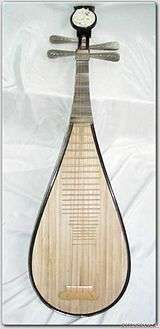琵琶
Chinese
| phonetic | |||
|---|---|---|---|
| simp. and trad. (琵琶) |
琵 | 琶 | |
| variant forms | 枇杷 批把 鼙婆 | ||

Etymology
Borrowed from a language in the Western Regions during the Han Dynasty. Compare Persian بربط (barbat, “barbat; lute”), Ancient Greek βάρβιτος (bárbitos, “barbitos; ancient stringed instrument”).
Both characters were initially non-checked-tone characters. Reborrowed during the Tang Dynasty from a source that more closely resembles the modern Persian name of the instrument, both characters were read as if they have checked codas. The original non-checked readings were restored after the Tang Dynasty. Compare the modern checked-tone dialectal readings of 枇杷 (pípá).
Much folk etymology exists surrounding the name origin. The dictionary Shiming [2nd CE] explains the name as 批把 (“slap-grasp”), reflecting the plucking movements while playing the stringed instrument. 琵琶 is also cognate with—and possibly gave rise to the name of (due to the similarity in shape)—枇杷 (pípá, “loquat”), which is also a non-native species.
Pronunciation
Derived terms
Japanese
| Kanji in this term | |
|---|---|
| 琵 | 琶 |
| び Jinmeiyō |
は > わ Jinmeiyō |
| on’yomi | |
Etymology
/bipa/ → /bifa/ → /biwa/
Borrowing from Middle Chinese 琵琶 (MC biɪ bˠa). The sound change of /f/ → /w/ is unusual in Sino-Japanese vocabulary.
Noun
Derived terms
- 琵琶合わせ, 琵琶合せ (biwa-awase)
- 琵琶歌 (biwauta)
- 琵琶打ち (biwa-uchi)
- 琵琶貝 (biwagai)
- 琵琶形銅剣 (biwa-gata dōken)
- 琵琶蟹 (biwagani)
- 琵琶記 (Biwaki)
- 琵琶湖 (Biwako)
- 琵琶行 (Biwakō)
- 琵琶琴 (biwagoto)
- 琵琶滝 (Biwa-daki)
- 琵琶の琴 (biwa no koto)
- 琵琶羽衣 (biwa hagoromo)
- 琵琶法師 (biwa hōshi)
- 琵琶鱒 (biwamasu)
- 楽琵琶 (gaku biwa)
- 五弦琵琶 (gogen biwa)
- 薩摩琵琶 (Satsuma biwa)
- 筑前琵琶 (Chikuzen biwa)
- 筑紫琵琶 (Tsukushi biwa)
- 錦琵琶 (nishiki biwa)
- 平家琵琶 (Heike biwa)
- 盲僧琵琶 (mōsō biwa)